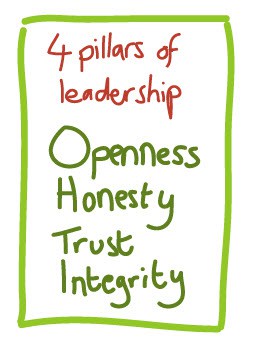How to Develop Your Personal Project Management Philosophy
It’s not uncommon for people in management positions to feel like they’re always playing catch-up.
I know I do. I want to do my projects to the best of my ability, but there’s so much to do and so little time to do it that it can be difficult to stay on top of everything, let alone have a chance to think about the bigger picture.
But if you want to enjoy this career and be successful in project management, one habit to get used to is reflection.
Take a step back and develop your own personal philosophy for work. Your project management philosophy is essentially your guiding principles for how you approach your work. It could be aligned to a methodology or a tailored approach that sums up how you like to lead.
In this article, you’ll learn how to develop a leadership philosophy for your projects and what skills are useful to underpin your chosen ways of working.
What is a project management philosophy?
A project management philosophy is a fundamental set of beliefs, values, and assumptions that guide how a project manager approaches their work.
It helps project managers to make decisions about how to best complete a project within the iron triangle constraints of time, budget, and scope – and all the other constraints that fall outside the somewhat outdated triangle model! Like resources, quality, customer satisfaction, and more.
You could argue that methodologies are a bit like philosophies.
I wouldn’t say that methods are philosophies. I think a philosophy is more personal than that, but I’m sure my own approach to project management has been very much shaped by the training and exposure I have had to professional standards.
Key takeaway: Project management philosophies guide how a project manager approaches their work, helping them to make decisions about how to best complete a project.
How to come up with your personal project management philosophy
A philosophy for the way you want to lead projects helps you make decisions about what projects to pursue, how best to execute them, and how to deal with problems along the way.
Without a clear philosophy, it’s all too easy to get sucked into how other people think you should be working. It’s easy to get caught up in the day-to-day grind and lose sight of your long-term goals.
Developing your own philosophy doesn’t have to be a complicated process. Just sit down and think about what’s important to you in your work.
What kind of projects do you enjoy working on?
How do you like to work with team members and clients?
What makes you feel good about the work you do?
What management approaches have you responded well to in the past? And which ones might you like to avoid?
The Agile Manifesto is a kind of philosophy, and it’s inspiring to read. Check that out if you are struggling for somewhere to start!
Once you have a good understanding of your own values and preferences, you can start to develop guidelines for how you’ll approach your work in the future. The way you enjoy working is a personal thing, so there’s no right or wrong answer.
The important thing is that you take the time to develop a set of values and an outlook on the job that works for you.
With a clear philosophy in place, you’ll be able to approach your work with a greater sense of purpose and direction, and that will make all the difference in your success as a project manager.
How do you develop a personal leadership philosophy?
Projects are about people, so as well as a statement on how you want to get the work done, it’s also worth reflecting on what do you want your leadership style to be.
Your personal leadership philosophy can be the difference between success and failure on a project. Stakeholders don’t engage if they don’t like working with you – fact.
So, how do you develop a personal leadership philosophy?
Here are four tips.

1. Define your values
The first step to developing a philosophy of personal leadership is to define your values.
What is important to you?
What do you believe in?
For me, that’s openness, honesty, trust, and integrity: the 4 pillars of my leadership attitude.
2. Define your vision
The second step is to define your vision.
What do you want to achieve as a leader?
What does project success look like for you?
What kind of impact do you want to make for your organization, and how will you evidence that?
If you have a PMO mission statement, vision statement, or set of goals, you might be able to draw inspiration from that.
3. Define your goals
Next, define your goals.
What are your goals as a leader, especially one with a remit for change implementation?
What do you want to achieve in your role?
You might be able to find inspiration for this in your job description, personal goals for the year set by your manager or your team’s goals.
Once you have a clear understanding of your values, vision, and goals, you can start to put your leadership philosophy into words.
4. Define your approach
The fourth and final step is to define your approach. Put it down in writing.
How do you want to achieve your goals?
What methods will you use?
It’s OK if what you write is not perfect. No one is going to see it except you. Developing a personal leadership philosophy is not something that you can do overnight, so draft something and come back to it later.
I use FutureMe.org to remind myself about my commitments and hold myself accountable. You could use that as a prompt to come back to your philosophy and reflection exercise later.
It takes time, thought, and effort. But, if you take the time to think through your leadership philosophy, it can be a valuable tool that will help you achieve success as a project manager.
Key skills that feed into a personal philosophy
The skills that support your ability to deliver projects and lead a team (and therefore should probably be woven into your philosophy somehow) are:
- Goal setting
- Communication
- Motivation.
Goal setting
Effective project leaders are able to set clear goals and objectives. This may seem like a no-brainer, but it’s actually one of the most important aspects of successful leadership.
Without clear goals, it’s very difficult to manage a project effectively – so mark that up as a skill to develop if you don’t think you’re quite there yet.
Stakeholder engagement
Effective leaders are able to communicate effectively.
This includes both written and verbal communication. Project managers should be able to communicate their vision for a project, as well as provide clear instructions to their team members.
Customer collaboration is also important, whether that’s internal customers or external clients, and it all falls under the umbrella skill of being able to engage effectively.
Motivation
Effective leaders are able to motivate their team members. This is essential for keeping a project on track.
If team members are not motivated, they will likely not be very productive. And experienced project managers will tell you that motivation tends to drop off as the project progresses because more people like being involved with new, strategic initiatives than they like the plodding to the finish line that projects often become.
It’s also worth considering your workplace environment. If you use an
Ultimately, having a philosophy of project management can help make you a more effective project manager. It gives you guardrails and boundaries for behavior. It underpins project management ethics and leadership.
Tips for creating your own project management philosophy
What works for one manager might not work for another. What fits with your current PMO might not work in a new organization if change jobs.
The key is to find a philosophy that works for you and your team. And why not work on it together and see what commonalities you can find? It is easier (in my experience) to have these conversations as a group. Perhaps your own personal take on work will drop out of those discussions.
Here are a few tips to help you create your own project management philosophy.
1. Consider where you are
Your team, and the organizational culture, is an important part of your project management philosophy. You need to consider how your ways of working fit into both what the project team needs and what the organization expects.
Will your approach motivate them?
What kind of environment do they thrive in?
Asking these questions will help you create a philosophy that will help your team be successful. It will also help you identify if your preferred way of leading is far apart from how the organization expects you to work… so you can find a job in a company that matches your values.
2. Be flexible
Your project management philosophy should be flexible. Things will change throughout the course of a project and your career.
Stick with broad concepts that could be applicable to a range of situations rather than saying, “My project philosophy is a predictive servant-leadership style.” Because that might not work in the long term.
3. Communicate your values
Once you have reflected and crafted a statement or two that sums up your take on how you want to approach project management, share it with your team. If you feel comfortable doing that – it’s also OK to keep it to yourself!
Final thoughts
Creating a project management philosophy is a worthwhile thought process to go through for any project leader who wants to be successful.
By taking the time to develop your own personal philosophy, you can ensure that you have a guiding set of principles to inform your decision-making and help you stay focused on your long-term goals.
Keep these tips in mind as you create your own project management philosophy, and you’ll be well on your way to success in no time.
There are a lot of tools and techniques for managing projects out there, but it can be tough to know which ones are right for your project. Rebel’s Guide to Project Management can help you figure that out. Why not have a browse around while you are here?
Pin for later reading

